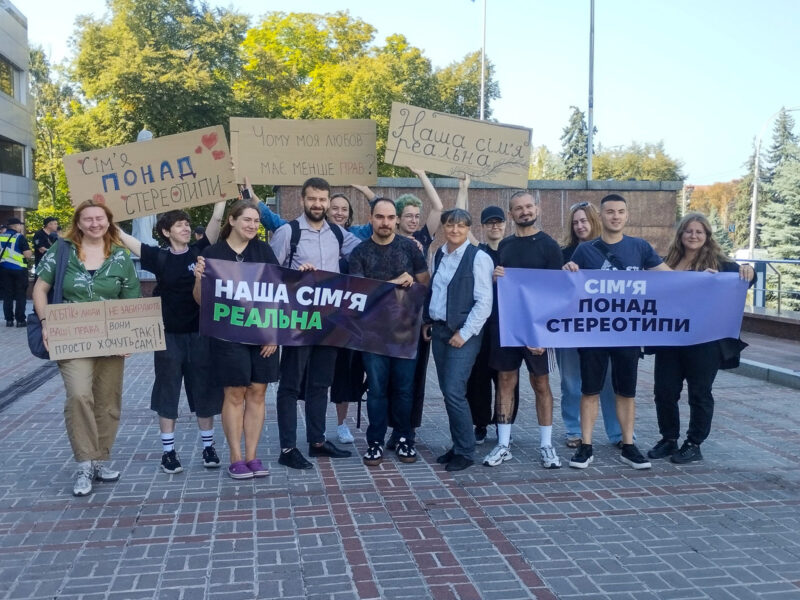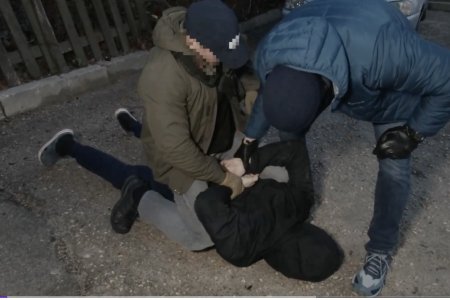
The Kyiv Court of Appeal has upheld a vital ruling from June 2025, which found that two men who have been in a relationship and living together since 2013 are, de facto, a married couple and are a family in accordance with Ukrainian law. The civic organization which had challenged the ruling had not been a party to the original court proceedings, but had claimed to have a personal interest because of their ‘defence of family values’.
The couple, diplomat Zoryan Kis and civic activist Tymur Levchuk were forced to lodge a court appeal in September 2024 after the Foreign Ministry refused to acknowledge Levchuk’s right to formally accompany Kis in the latter’s appointment as First Secretary in the Ukrainian Embassy in Israel, The reason given had been that according to Ukrainian legislation, marriage is between a man and a woman.
In her ruling on 10 June 2025, Judge Valeria Babko from the Desniansky District Court, noted that the plaintiff (Kis) had argued that the couple had been together since 2013 and had married in a civil ceremony after four years as a couple. Later, on 14 May 2021, they had married online in the state of Utah (USA). In his testimony to the court, Levchuk had pointed out that the couple share their life, take decisions jointly, share costs and run a home together, etc.
The court cited Ukraine’s Constitution, as well as various parts of the Family Code, beginning with Article 3 which gives a fairly broad definition of family, and says that this is “formed on the basis of marriage; blood relations; adoption; as well as on other bases, not prohibited by law and which do not contradict society’s moral principles.”
It also pointed to Ukraine’s obligation to comply with the judgements and practice of the European Court of Human Rights [ECHR] and noted that the latter has repeatedly found that a state’s refusal to recognize de facto single-sex marriages may violate the person’s right to respect for their private and family life, as enshrined in Article 8 of the European Convention on Human Rights.
The ruling should make it possible for Zoryan to successfully challenge the Foreign Ministry’s refusal, and was warmly welcomed by the couple themselves, as well as by the civic organization Insight, which had supported the legal challenge.
It was opposed by the civic organization ‘All together’ which defends what it views as ‘traditional family values’. It is not only openly hostile to issues pertaining to LGBT equality, but has been fined twice by Ukraine’s National TV and Radio Broadcasting Council for homophobic material.
The organization tried to justify their appeal, despite not having been a party to the original ruling, by claiming that they had their own interest in “defending the institution of the family and countering the legalization of single-sex partnerships.”
Three representatives of the organization took part in the hearing on 10 September 2025 before a panel of three judges from the Kyiv Court of Appeal. They objected, Graty explains, to the fact that the Desniansky District Court had not only established the fact that Kis and Levchuk were living as one family, but had used the wording “de facto marriage relations” in its ruling. They asserted that there is no such expression in Ukraine’s legal framework and that it had been used in order to change legislation in the future.
Ukraine’s Civic Procedure Code allows appeals against a court ruling if the latter directly impacted upon a person’s rights, freedoms, interests or duties. This needs, however, to be properly demonstrated and both Kis and Levchuk, and their lawyer Oksana Huz, were adamant that the civic organization ‘All together’ had not demonstrated an infringement of their rights. They asked the court to not only terminate the proceedings, but to impose a fine on the civic organization for, they asserted, abusing their procedural rights.
The Kyiv Court of Appeal concluded that the earlier ruling had, “in no way obstructed the civic organization ‘All together’ in carrying out its activities as per its charter; in observing its religious convictions and its traditional views about the family”. The Court terminated the proceedings, leaving the Desniansky District Court ruling in force, but saw no grounds for imposing a fine.
Although the second ruling has also come into force, a cassation appeal can be lodged within 30 days, with the head of the organization, Ruslan Kukharchuk having said that they plan to do so.
Graty quotes Oksana Huz as saying that, while neither of the court rulings makes any changes to current legislation, they could influence legislative policy in the future. She called the appeal ruling “entirely legitimate as a third party, which has not suffered any violation of their rights and duties, is interfering in people’s private family life.” While this is not the first such ruling in general, it is the first that pertains to single-sex couples.



